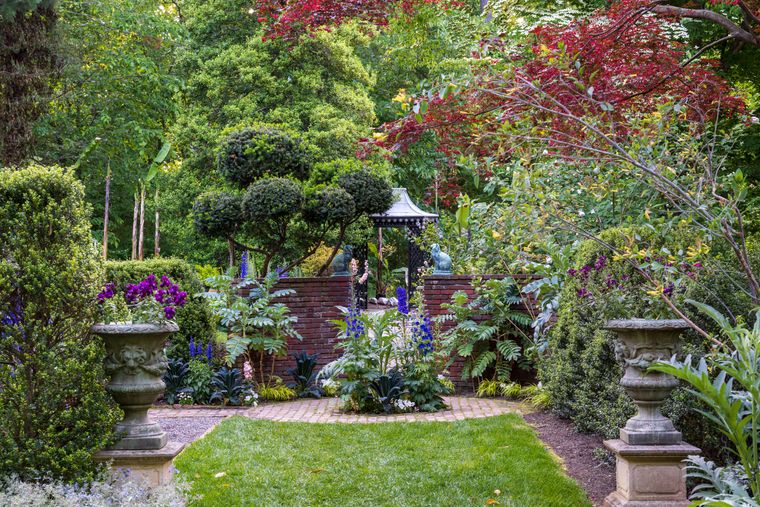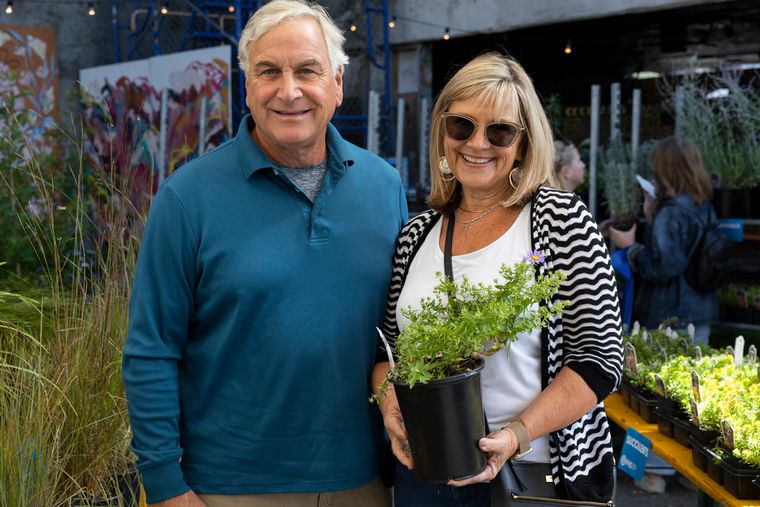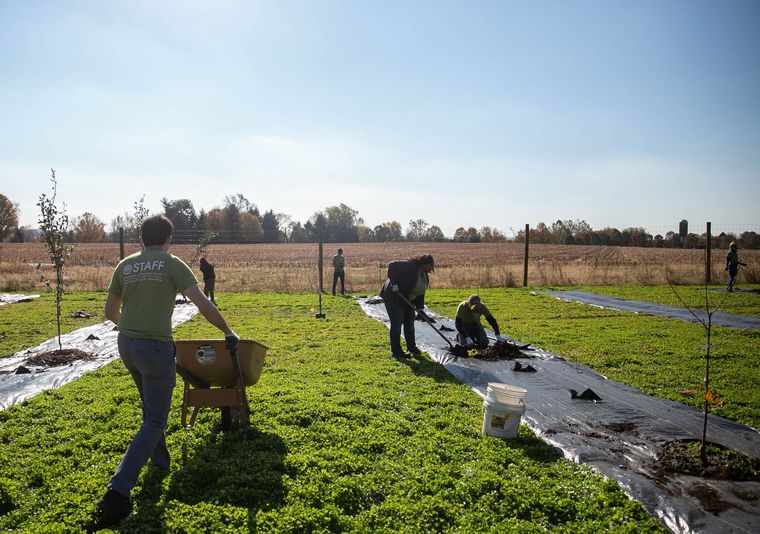



Inside the 2024 PHS Gold Medal Plant Winners with Steve Mostardi
plant care
sustainable gardening
garden inspiration

By Melissa O’Brien
In the realm of horticulture, there's a prestigious accolade that stands as a beacon of excellence — the Gold Medal Plant Program, created by PHS in 1979 to celebrate and showcase beautiful, easy-to-grow plant species ideal for home gardening. Since the program’s inception, PHS has named over 150 Gold Medal Plants. Including this year’s winners, all plants are indicated for their hardiness in zones 4 to 8 on the USDA’s hardiness zone map, making them ideal choices for the Mid-Atlantic region. This year, PHS proudly announces our list of 2024 Gold Medal Plant winners, now available to the public through most garden retailers.
In a recent interview with Steve Mostardi, Chair of the Gold Medal Plant Committee and owner of Mostardi Nursery, a full-service, three-generation garden center based in Newtown Square, we delved into the inner workings of this esteemed initiative.
The Gold Medal Plant Selection Process
The genesis of the Gold Medal Plant Committee dates back several decades, where Steve found himself intricately involved since the last century — a testament to his enduring commitment to botanical excellence. The committee is comprised of nursery owners, horticulturists, expert gardeners, and professional growers. As the committee chairman, Steve sheds light on the meticulous process of selecting the gold medal-worthy flora.
"The journey begins with the solicitation of nominations," Steve explains, "where committee members, alongside open submissions, propose candidates that meet certain criteria." Through a rigorous vetting process spanning months, the nominees undergo scrutiny for their hardiness, suitability for regional gardening, and resilience against pests and diseases. The final verdict, arrived at through extensive voting and discussions, culminates in the annual awarding of the coveted gold medals.
Embracing Sustainability
A hallmark of the Gold Medal Plant Program lies in its unwavering dedication to innovation and sustainability. Steve highlights the evolving emphasis on native plants, reflecting a broader industry trend towards ecological stewardship.
"These carefully selected plants not only adorn landscapes," Steve remarks, "but also serve as problem solvers, offering homeowners and professionals alike a palette of resilient, low-maintenance choices."
The Impact
The impact of the Gold Medal Plant Program goes beyond just accolades, transcending into tangible benefits for gardeners and landscapers. By eliminating guesswork and offering a seal of approval akin to the revered “Good Housekeeping Seal,” these plants promise not just aesthetic allure but also practical solutions for diverse settings, from urban gardens to commercial landscapes.
"For enthusiasts eager to embrace these botanical gems," Steve recommends, "perusing the Gold Medal website and visiting your local garden center, many of which extend exclusive discounts to PHS members."
The 2024 Gold Medal Plant Winners
Andrew Bunting, PHS’s Vice President of Horticulture, expresses the significance of this year's selections, stating, "The PHS Gold Medal Plant program provides amateur and professional gardeners alike with unique plant species suggestions to help refresh their gardens with easy-to-grow, hardy perennials, trees, shrubs, and edibles, many of which also bring ecological function to the garden and benefit local wildlife."
This year's Gold Medal Plant winners, spanning a diverse array of species, offer a testament to nature's bounty and resilience. Among the distinguished recipients are:

1. Asparagus officinalis ‘Millennium’ (Edible)
- Boasting one of the highest yields among asparagus varieties, Asparagus officinalis 'Millennium' produces tender spears with exceptional flavor.
- Hardy and easy to grow, this stem vegetable thrives in full sun and well-drained soil, offering not just edible shoots but also attractive foliage.
- Disease, deer, and drought-resistant, Asparagus officinalis 'Millennium' is a reliable choice for home gardens across hardiness zones 3-10.

2. Illicium ‘Woodland Ruby’ (Shrub)
- 'Woodland Ruby,' also known as Florida anise tree, captivates with its deep reddish strap-like flowers, blooming from early summer to fall.
- Thriving in shade and adaptable to various settings, this shrub is a versatile addition to city gardens, attracting pollinators and emitting a fragrant aroma.
- With a mature height of 6-7 ft., 'Woodland Ruby' serves as an excellent screen or backdrop, enhancing the aesthetic appeal of any landscape in zones 6-9.

3. Magnolia ‘Genie’ (Tree)
- Perfect for small space gardens, 'Genie' dazzles with its spring flowering display of red to purple scented blooms, followed by repeat blooms throughout the season.
- With its narrow columnar form, this magnolia tree fits seamlessly into any landscape, thriving in sun to part shade and slightly acidic, well-drained soils.
- Hardy in zones 5-8, 'Genie' promises to be a showstopper, reaching a modest height of 10-13 ft. and adding a touch of elegance to any garden.

4. Cephalanthus occidentalis Sugar Shack® (Shrub)
- A compact version of the native buttonbush, Cephalanthus charms with its fragrant, globe-like flowers in summer, followed by burgundy foliage in fall and red fruit in winter.
- Adaptable to various conditions, this shrub attracts a plethora of pollinators while maintaining a manageable size of 5 ft. tall and wide at maturity.
- Thriving in moist, humus soils and hardy in zones 4-8, Cephalanthus offers a delightful burst of color and texture to any garden space.

5. Iris tectorum (Perennial)
- Commonly known as Japanese roof iris, this perennial delights with its showy flowers in shades of lavender blue, blush violet, and blue lilac.
- Well-suited for organically rich, medium moist soils in full sun to part shade, Iris tectorum thrives with the shelter of a wall and winter mulch.
- Deer resistant and hardy in zones 6-9, this iris spreads rapidly, forming a picturesque backdrop in gardens of any size.

6. Tiarella cordifolia ‘Brandywine’ (Perennial)
- An early season bloomer, 'Brandywine' foamflower enchants with its long-lasting spikes of white flowers above bronze foliage, thriving in part to full shade.
- Native to the region, this perennial is adaptable to both dry and moist soils, attracting specialist bee species and other pollinators.
- With a compact height of 8-18 in. and deer resistance, 'Brandywine' is a versatile choice for small space gardens, containers, and window boxes in zones 4-8.
These exceptional plants, carefully selected by the Gold Medal Plant Committee, promise to transform landscapes, enriching the lives of gardeners and wildlife alike. For more information on these and previous year's winners, visit the PHS Gold Medal Plants page.
As we embrace the beauty and resilience of nature, let us cultivate gardens that not only inspire but also sustain, nurturing a greener, more vibrant world for generations to come.
Want to see more? Explore the full list in the Gold Medal Plant Database.


